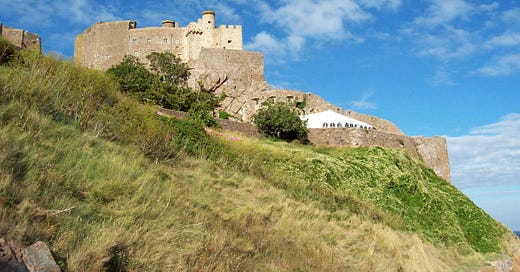Gilbert Millington died at Mont Orgueil castle this week in 1666. He had been a member of Parliament and one of the barristers who played a part in the trial of King Charles I for high treason, in which he was charged with having caused the deaths of almost 85,000 citizens, with a further 100,000 dying from war-related disease during the civil war. Millington's signature was one of the close-to 60 names that appeared on the king's death warrant.
After the king was beheaded, Millington was tried for his part in the regicide, sentenced to death, and sent to the Tower of London to await his fate. While a prisoner there, he wrote to King Charles II begging forgiveness, and was successful in winning his life. However, the new king sentenced him to life imprisonment and confiscated his estate, and he was sent to serve out his sentence in Jersey at Mont Orgueil (below), where he died.
Jersey Railway fatality
The construction of Jersey's Gorey Railway began this week in 1872. The honour of cutting the first sod went to one of the directors' wives. However, despite being the centre of attention – not to mention the one who did the heavy lifting – she didn’t even get a name check in the paper. In fact, rather than using it as an opportunity to promote the coming railway, the company decided that the event should be private, with few spectators except for the specially invited guests. It took almost 20 years for construction of the line to be completed.
Philip Pinel would be killed on the railway 13 years later when he fell between two carriages and was crushed by the train's axle box. This was still smeared with his blood when police arrived at the scene. His son witnessed the accident and called for the train to stop, then jumped down to the tracks to rescue his father. By the time of the inquest, this week in 1885, nobody could agree on which carriage Pinel had fallen from, or which one he was found under. The inquest passed a verdict of accidental death.
Mail ship wrecked at Corbiere
The mail ship was wrecked on rocks at Corbiere (below) this week in 1859. It was carrying 200 passengers and three horses. Although visibility was good, the ship stayed close to shore as it worked its way from St Helier, and the St Helier harbourmaster, among the passengers, reportedly commented that he had never seen any boat follow the exact course they were taking, just before the ship struck the rocks.
Despite taking on water, its engines were still running and the captain managed to turn the ship and park it between rocks close to land. The remaining 197 passengers made it safely ashore. The ship had had a notable history, being the vessel on which King Louis Philippe of France escaped to England in 1848 when forced to abdicate at the outbreak of the French Revolution.
Jersey girl dies of neglect
Eva Downton died of neglect at Jersey General Hospital this week in 1883. Her mother, Emily, was charged with infanticide. She had already been sentenced to a month of hard labour upon a previous conviction of neglect, and, giving evidence at her trial, surgeon Charles Godfray said that by the time she was four years old, her daughter had weighed just 1.1 stone or 7.25kg including her clothes. The healthy weight for a child of her age in the early 1880s would have been 4 stone or 25.5kg.
The mother's hard upbringing, entry into service, falling pregnant by her employer’s son, being turned away by her parents once the child arrived, and being forced to live on the street were all explained to the jury. Nonetheless, the jury withdrew for just 10 minutes before returning a guilty verdict. The attorney-general initially sentenced her to seven years’ penal servitude but, on hearing opinions from other jurats, settled on two years’ imprisonment with hard labour.
Jersiais champion born
Writer Philippe Langlois was born in Jersey this week in 1817. He was a qualified doctor and a medical officer in the Royal Jersey Militia, but he is remembered as an author and poet who wrote in Jèrriais. Langlois came to prominence by studying in Paris and Dublin before returning to Jersey, where he served as a deputy in the States and was eventually elected a Jurat. He is best known for being president of La Société Jersiaise, where he started work on a Jèrriais dictionary, the Glossaire du Patois Jersiais. Langlois died on June 19, 1884, but work continued on the dictionary for another 40 years, with it eventually being published in 1924.






